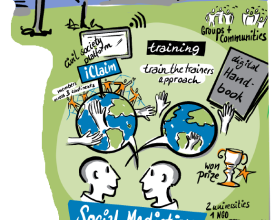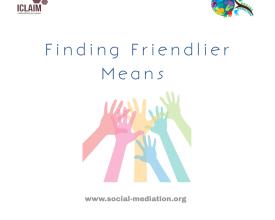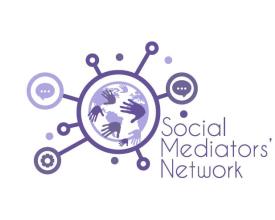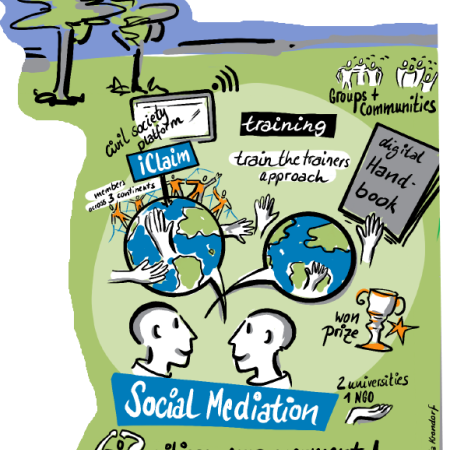
Social Mediation for Global Collaboration
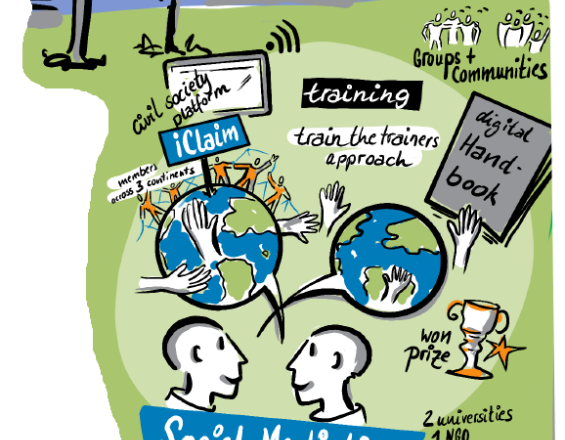
The Interdisciplinary Centre for Law, Alternative and Innovative Methods (ICLAIM) is a Cyprus-based non-profit social enterprise. Since 2018 it has been running the project ‘Social mediation in Practice’. The aim of the project is to promote ‘Social Mediation’ as a conflict resolution tool in cases of social conflict. The Social Mediation for Global Collaboration project aims to expand collaborations with partners from around the world, who are willing and able to promote Social Mediation in their respective contexts. This exercise aims to expand the expertise of our diverse Social Mediators’ Network, established in September 2020 and showcase the utility of Social Mediation across different social and geographical contexts, from Africa to the Mediterranean, and to Asia. The project aims to be implemented from March to December 2022.
Context
Challenges addressed
Social Mediation (SM) is a conflict resolution tool used for conflicts in a social context, placing individuals and communities across the world at the forefront, in turbulent times. The project uses theoretical concepts around group dynamics, identity, social change and transitions, proposing concrete solutions to the tensions arising from the socio-economic consequences of the COVID-19 pandemic. SM can be used in dealing with complex and sensitive issues of identity, prejudices, stereotyping and exclusion, all exacerbated around the world by the COVID19 pandemic. The representatives of ICLAIM’s global partners will have to propose up to two participants for the workshop.
Location
Process
Summary of the process
The Social Mediators' Network consists of the pool of participants that have expressed an interest to remain engaged with the project in the long term. They continue training others into Social Mediation within their own national, regional or communal contexts. At the same time, the theme-specific Manuals, bring together the theoretical, academia-oriented, expertise and empirical experience from the field. Written in a simple and accessible manner, while they are publicly available for free, ensure that dissemination of both the theoretical and the practical knowledge and experience is available to anyone interested in the long-term. To this process, the workshops are the practical experience that brings together old and new network members, contributing to further expanding the project.
Building Blocks
Social Mediation Training Workshops and Manuals
Social Mediation (SM) is a conflict resolution tool used for conflicts in a social context, placing individuals and communities across the world at the forefront, in turbulent times. The project uses theoretical concepts around group dynamics, identity, social change and transitions, proposing concrete solutions for the tensions deriving from the socio-economic consequences of the pandemic which divide people in renewed ways. Training workshops use a ‘train-the-trainers’ approach, allowing for multiplier effects and encouraging the spreading of the methodology in communities across the globe. At the same time, all participants and network members and stakeholders learn from each other through a two-way interactive process. We also envisage the preparation of a Global Social Mediation Manual, with the direct and active contribution of our partners, offering solutions based on their local context, which may be adapted and applied to other similar contexts across the world.
Enabling factors
Global Network, Technology, Local Expertise
Lesson learned
Workshops have been an interactive way to build on previous experience, and collect feedback from participants on further training, information, and expertise needed for the expansion of the project, which we then use to produce deliverables and also to plan future activities. The activities are based on the Social Mediation Handbook, published in 2018. Manuals based on this handbook and the workshops have proven a strong resource to preserve the knowledge gathered and ensure its long-term sustainability.
Social Mediators' Network (SMN)
The SMN was launched in September 2020, to offer trained Social Mediation the opportunity to have an accessible forum through which to exchange experience, raise concerns and ask for advice from more experienced Social Mediators. Moreover, based on their local experience, they can provide feedback for future opportunities and take initiatives in the context of the existing Social Mediators’ Network, to maximise sustainability, self-learning, empowerment and inclusion. The SMN uses a horizontal structure so that any member can take their own initiatives and present them to the group. Logistical support for the Network is offered by ICLAIM.
Enabling factors
Network, Technology, Digital Network Application (currently being developed)
Lesson learned
Considering that the COVID19 pandemic interrupted our normal flow of work, Network members were still able to hold two meetings to date and contribute to suggestions for the networks future support. Using the internet as the main communication tool, the Network has enabled participation from countries across three continents. We are currently developing an app to allow network members to maintain more consistent contact with each other.
Impacts
Workshops use a ‘train-the-trainers’ approach, allowing for multiplier effects and encouraging the spreading of the methodology in communities across the globe. At the same time, all participants and network members and stakeholders learn from each other through a two-way interactive process. To allow for limited costs and maximum participation, the initial Social Mediation training will be conducted on a blended or exclusively online mode. The representatives of ICLAIM’s global partners will have to propose up to two participants for the workshop. The proposed initiative is well anchored in the UN 2030 Agenda with which it has been working for some years already, aiming at social transitions locally and regionally. The proposed initiative would allow the entire project of social mediation in practice to go global and participate through sustainable development through individual and collective empowerment and social inclusion in times of pandemic.
Beneficiaries
Vulnerable social groups, with a focus on youth and women, community leaders, law enforcement and disaster prevention professionals.
Sustainable Development Goals
Story

In the earliest workshops on Social Mediation we had organised, we used to get very diverse groups of participants, as the project was not yet focusing on specific target groups and specialised themes, but rather was an invitation for participants from all walks of life, across cultures, age groups, or other backgrounds. We knew Social Mediation had potential, when in one of those early workshops, while exchanging views and feedback with participants, one of them said in a very excited tone: ‘I’ll start using Social Mediation at home with my family!’. Indeed, what better place to start striving for stronger social bonds, than with your nearest people?
